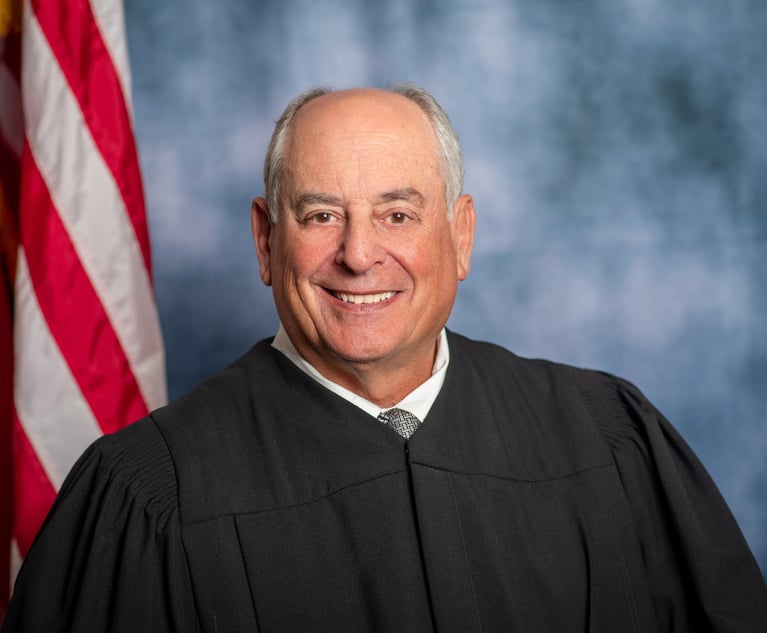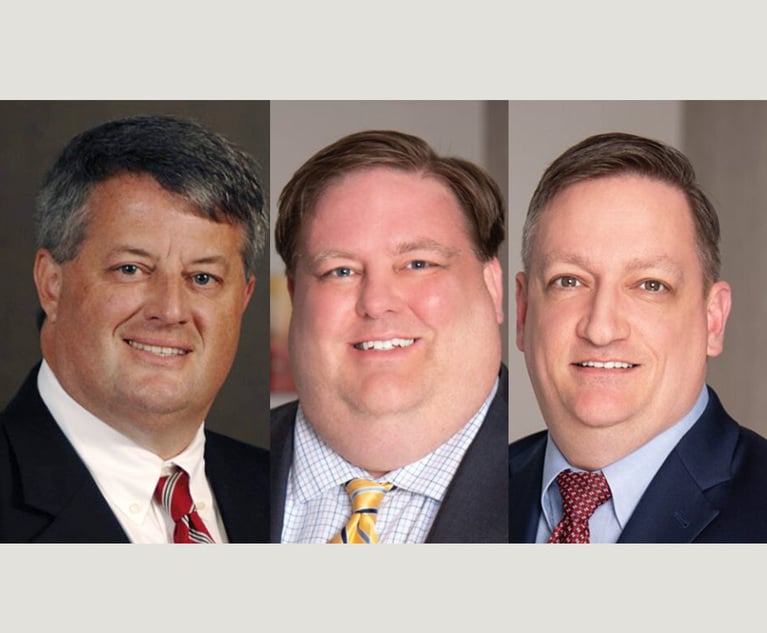 Gilbert Deitch of Deitch & Rogers, Atlanta. (Photo: John Disney/ALM)
Gilbert Deitch of Deitch & Rogers, Atlanta. (Photo: John Disney/ALM)Lifetime Achievement: Gilbert Deitch
"Helping the victims of violence is extremely satisfying, knowing victims achieved success overcoming adversity."
June 19, 2019 at 02:00 PM
5 minute read
Gilbert Deitch has been called a trailblazer in premises liability and negligent security law—but he also was an innovator in another part of legal practice. He was one of the first lawyers in Atlanta to issue press releases about his cases.
Deitch told the Daily Report in 2005 that he began working with public relations firms after observing the practices of federal prosecutors. Once Deitch issued the releases, reporters began to call—and they have had plenty to report.
The Daily Report published articles about 12 verdicts in which Deitch represented or co-represented the plaintiffs, each averaging $1.5 million.
That tally did not include two huge cases that ultimately settled: a case against Atlanta Olympic Games organizers and corporations involved in the 1996 Centennial Olympic Park bombing, on behalf of the widower of a woman murdered there; and a case against Six Flags for a young man severely beaten as he left the park.
The Six Flags case produced a $35 million verdict before settling after multiple appeals.
Deitch's law partner, Andrew Rogers, said, “Anyone who knows about negligent security law in Georgia—plaintiff and defense attorneys, judges and mediators—knows that Gil has long since been a lifetime achiever and is most deserving of this recognition after 48 years of practicing law.”
What drew you to premises liability law?
In 1985, a crime victim was referred to us, and we helped her—plus seven other victims—at the same property. Crime victims became aware that civil litigation was an additional method for them to retaliate, regain self-confidence and achieve a sense of victory over devastation. That has been our mission ever since.
Who was one of your mentors in the law, and what did you learn from that person?
Two mentors. While in law school, I worked for civil trial attorney Charles Goins, who was then known for his balanced wisdom. Then, shortly into my 48 years of law practice, I had the opportunity to work with trial attorney James F. Neal, who represented numerous Fortune 500 companies as well as being the prosecuting trial attorney of the Watergate defendants. From both attorneys, I learned the importance of integrity, perseverance, tenacity and respect for the law.
How does spending so many years suing over accidents (and worse) that occur on others' property affect your day-to-day observation of the outside world? Do you notice potential liability risks everywhere you go?
The world is a violent place. Many have no respect for the value of life, which to a great degree is the result of the lack of family and family values.. Over the years, I have taken testimony from many such criminals which confirmed my observation. Helping the victims of violence is extremely satisfying, knowing victims achieved success overcoming adversity.
Yes, I see things out of place or missing all the time. However, there are many positive risk reductions with ever-changing technology that greatly assists crime prevention and crime deterrence.
Please tell us about a case in your career in which you are particularly proud.
In the 1996 Olympic Park bombing, Alice Hawthorne was killed by shrapnel while attending the festivities with her daughter and celebrating her daughter's birthday. The premises liability civil case against the Atlanta Committee for the Olympic Games and several corporate defendants lasted eight years, with several depositions, motions, briefs and appeals. It ultimately resolved after the Georgia Supreme Court was involved, ruling there was a jury question whether the use of Atlanta's Centennial Olympic Park was for recreational or commercial purposes.
Meanwhile, during the civil litigation, bomber Eric Rudolph was a fugitive living in the mountains of North Carolina, and I watched the federal manhunt unfold. He was finally captured “Dumpster-diving” in a small North Carolina town. I attended the sentencing hearing as federal agents were high-fiving one another after he pled guilty to be imprisoned for life without parole. He is serving his sentence at the U. S. government's Supermax prison in solitary confinement. It was an exceptional experience.
What change in the practice of law would you like to see occur in the next 10 years?
I would like to see more candor and civility between trial attorneys, as stated in Malautea v. Suzuki Motor Company, LTD., 987 F.2d 1536 (11th Cir. 1993).
“All attorneys, as 'officers of the court,' owe duties of complete candor and primary loyalty to the court before which they practice. An attorney's duty to a client can never outweigh his or her responsibility to see that our system of justice functions smoothly.”
“We must return to the original principle that, as officers of the court, attorneys are servants of the law, rather than servants of the highest bidder. We must rediscover the old values of our profession. The integrity of our justice system depends on it.”
This content has been archived. It is available through our partners, LexisNexis® and Bloomberg Law.
To view this content, please continue to their sites.
Not a Lexis Subscriber?
Subscribe Now
Not a Bloomberg Law Subscriber?
Subscribe Now
NOT FOR REPRINT
© 2025 ALM Global, LLC, All Rights Reserved. Request academic re-use from www.copyright.com. All other uses, submit a request to [email protected]. For more information visit Asset & Logo Licensing.
You Might Like
View All
North Carolina Courts Switch to Digital, Face Extreme Weather in 2024

'A 58-Year-Old Engine That Needs an Overhaul': Judge Wants Traffic Law Amended
3 minute read
Fulton Jury Returns Defense Verdict After Pedestrian Killed by MARTA Bus
8 minute read
'The Best Strategy': $795K Resolution Reached in Federal COVID-Accommodation Dispute
8 minute readTrending Stories
- 1Deal Watch: Latham, Paul Weiss, Debevoise Land on Year-End Big Deals. Plus, Mixed Messages for 2025 M&A
- 2Bathroom Recording Leads to Lawyer's Disbarment: Disciplinary Roundup
- 3Conn. Supreme Court: Workers' Comp Insurance Cancellations Must Be Unambiguous
- 4To Avoid Conflict, NYAG Hands Probe Into Inmate's Beating Death to Syracuse-Area DA
- 5Scripture-Quoting Employee Sues Company for Supporting LGBTQ Pride
Who Got The Work
Michael G. Bongiorno, Andrew Scott Dulberg and Elizabeth E. Driscoll from Wilmer Cutler Pickering Hale and Dorr have stepped in to represent Symbotic Inc., an A.I.-enabled technology platform that focuses on increasing supply chain efficiency, and other defendants in a pending shareholder derivative lawsuit. The case, filed Oct. 2 in Massachusetts District Court by the Brown Law Firm on behalf of Stephen Austen, accuses certain officers and directors of misleading investors in regard to Symbotic's potential for margin growth by failing to disclose that the company was not equipped to timely deploy its systems or manage expenses through project delays. The case, assigned to U.S. District Judge Nathaniel M. Gorton, is 1:24-cv-12522, Austen v. Cohen et al.
Who Got The Work
Edmund Polubinski and Marie Killmond of Davis Polk & Wardwell have entered appearances for data platform software development company MongoDB and other defendants in a pending shareholder derivative lawsuit. The action, filed Oct. 7 in New York Southern District Court by the Brown Law Firm, accuses the company's directors and/or officers of falsely expressing confidence in the company’s restructuring of its sales incentive plan and downplaying the severity of decreases in its upfront commitments. The case is 1:24-cv-07594, Roy v. Ittycheria et al.
Who Got The Work
Amy O. Bruchs and Kurt F. Ellison of Michael Best & Friedrich have entered appearances for Epic Systems Corp. in a pending employment discrimination lawsuit. The suit was filed Sept. 7 in Wisconsin Western District Court by Levine Eisberner LLC and Siri & Glimstad on behalf of a project manager who claims that he was wrongfully terminated after applying for a religious exemption to the defendant's COVID-19 vaccine mandate. The case, assigned to U.S. Magistrate Judge Anita Marie Boor, is 3:24-cv-00630, Secker, Nathan v. Epic Systems Corporation.
Who Got The Work
David X. Sullivan, Thomas J. Finn and Gregory A. Hall from McCarter & English have entered appearances for Sunrun Installation Services in a pending civil rights lawsuit. The complaint was filed Sept. 4 in Connecticut District Court by attorney Robert M. Berke on behalf of former employee George Edward Steins, who was arrested and charged with employing an unregistered home improvement salesperson. The complaint alleges that had Sunrun informed the Connecticut Department of Consumer Protection that the plaintiff's employment had ended in 2017 and that he no longer held Sunrun's home improvement contractor license, he would not have been hit with charges, which were dismissed in May 2024. The case, assigned to U.S. District Judge Jeffrey A. Meyer, is 3:24-cv-01423, Steins v. Sunrun, Inc. et al.
Who Got The Work
Greenberg Traurig shareholder Joshua L. Raskin has entered an appearance for boohoo.com UK Ltd. in a pending patent infringement lawsuit. The suit, filed Sept. 3 in Texas Eastern District Court by Rozier Hardt McDonough on behalf of Alto Dynamics, asserts five patents related to an online shopping platform. The case, assigned to U.S. District Judge Rodney Gilstrap, is 2:24-cv-00719, Alto Dynamics, LLC v. boohoo.com UK Limited.
Featured Firms
Law Offices of Gary Martin Hays & Associates, P.C.
(470) 294-1674
Law Offices of Mark E. Salomone
(857) 444-6468
Smith & Hassler
(713) 739-1250






